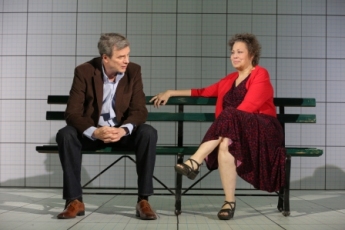Review: Love and Information

A scene from Love and Information
(©Joan Marcus)
Caryl Churchill’s new play Love and Information features more than a hundred characters in some fifty short scenes ranging in length from a few seconds to several minutes, presented in rapid-fire succession. Here’s a quick summary of every single one of them:
Just kidding…that exercise would constitute a sheer overload of information. That’s perhaps the point of this typically audacious effort from the experimental playwright who’s given us such noteworthy works as Top Girls, Cloud Nine, Mad Forest and many others. Many of them received their American premieres at the New York Theatre Workshop, which is also presenting this play that debuted at London’s Royal Court Theatre.
Unfortunately, for all the daringness of its conceit, Love and Information is more numbing than illuminating about its titular themes. Resembling a series of half-baked ideas hastily jotted down in a notebook, it offers more potential than substance.
Veering from the comic to the tragic, the theatrical sketches are often frustratingly amorphous. Such moments as when a patient who’s been given a fatal diagnosis asking her doctor how long she has to live, a young woman informing her brother that she’s actually his mother, and a woman trying to explain the concept of physical pain to someone who can’t feel any deliver situations fraught with drama left unexplored.
Others, such as a man boasting about the virtues of his virtual girlfriend (shades of Spike Jonze’s recent film Her) or a waiter delivering countless linguistic variations of the word “table,” feel like undeveloped comedy sketches.
Certainly there’s no faulting the ingenious staging by James Macdonald or the endlessly versatile performances by the large ensemble composed of such estimable performers as Randy Danson, Jennifer Ikeda, Karen Kandel, Kellie Overbey, Maria Tucci, James Waterston and others. The action takes place within a gleaming white cube, with the quicksilver scene changes happening as if by magic. The soundtrack during the blackout transitions--ranging from The Simpsons theme music to industrial noises to the sound of babies crying—often humorously relate to the action.
Considering the sheer volume of the situations presented, it’s not surprising that some of them are amusing, moving or piquant. But few are memorable. The evening, running nearly two numbing hours, feels like the theatrical equivalent of a meal composed entirely of single bites from different dishes. It may fill you up, but it isn’t very satisfying.
Minetta Lane Theatre, 18 Minetta Lane. 800-982-2787. www.ticketmaster.com. Through March 23.
| Print article | This entry was posted by Frank on 02/20/14 at 05:56:54 am . Follow any responses to this post through RSS 2.0. |